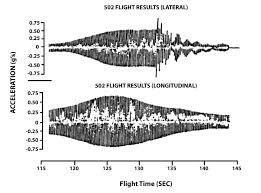90 Minute Webinar
Pogo is defined as an unstable interaction between a launch vehicle structural mode and a propulsion system mode. It is usually characterized by a “football” shaped acceleration curve which shows an increasing acceleration for a period of time (negatively damped system), sometimes followed by a period of limit cycle acceleration and then typically followed by a period of decreasing acceleration. Early in flight, while the vehicle mass is at peak value, the vehicle mass-stiffness distribution leads to a relatively low structural mode frequency. As flight progresses, the vehicle quickly loses mass (burning propellant) with very little change in vehicle stiffness. This typically leads to an increase in vehicle structural mode frequency. For this reason, a pogo event is usually short lived, but can still be damaging to payload or the vehicle depending on the acceleration levels achieved during the unstable interaction.
This webinar provides an overview of the pogo stability challenge, a historical view of the pogo phenomenon, guidance on the performance a pogo stability analyses, and insight into the most common fix for the typical pogo interaction.
Presented by the AIAA Liquid Propulsion Technical Committee

Learning Objectives
- Understand the history of pogo stability
- Understand the basics of the pogo stability problem
- Understand how to conduct a pogo stability analysis using modern tools
- Understand how to resolve a potential pogo instability
Audience
This webinar is relevant to engineers and managers tasked with designing launch vehicles or having responsibility for launch vehicle dynamics. This topic usually spans a gap between guidance, navigation and controls engineers and the propulsion system engineers. It is most common for propulsion system engineers to be responsible for the vehicle pogo stability. between guidance, navigation and controls engineers and the propulsion system engineers. It is most common for propulsion system engineers to be responsible for the vehicle pogo stability.
Instructors
David Ransom is a Director of R&D at Southwest Research Institute, in San Antonio, Texas. His research interests include fluid and machinery systems for propulsion and energy applications. He is experienced in the areas of rotordynamics, structural dynamics, finite element analysis, fluid-thermal systems, root cause failure analysis, modeling and simulation, and test rig development. He also manages the NPSS Consortium, developing simulation tools for air and liquid breathing engine systems. David received his M.S. (Mechanical Engineering, 1997) and his B.S. (Engineering Technology, 1995) from Texas A&M University.